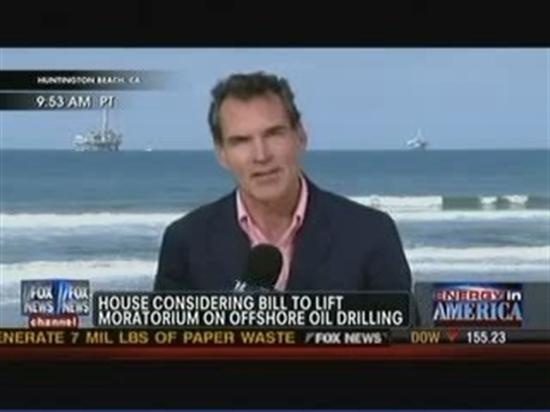In Case You Missed It
FOX News: House to Vote on Lifting Offshore Oil Moratorium
WASHINGTON, D.C.,
May 11, 2011
|
Jill Strait, Spencer Pederson or Crystal Feldman
(202-225-2761)
Energy in America: House to Vote on Lifting Offshore Oil Moratorium With almost 98 percent of America's offshore oil off-limits to drilling, and sustained gas prices nearing $4 a gallon, congressional Republicans say only one thing is keeping America from tapping into its offshore resources -- President Obama. On Wednesday, Congress will consider a bill to void that. The House is expected to pass H.R. 1231, a bill titled, "Reversing President Obama's Offshore Moratorium Act". Here's what it would do: -- Require the administration to allow drilling in at least 50 percent of the Outer Continental Shelf areas known to contain the most oil and gas. Specifically, that means southern California, the Arctic, mid-Atlantic and Eastern Gulf of Mexico. -- Open up other areas in the southern Atlantic and allow governors there to to opt in to the plan if they chose. -- Require the federal government to establish production targets for oil and gas. Currently, that would mean 3 million barrels a day of oil, or roughly three times more than the U.S. currently produces from offshore sources. The bill is one of three recent pieces of legislation aimed to open up coastal waters that Obama declared off-limits in a seeming reversal of his own policy. Less than three years ago, a Democratically-controlled House and Senate lifted a 27-year congressional ban on offshore drilling off the Atlantic, Pacific and Arctic. The move was accompanied by then-President George W. Bush announcing he was lifting a presidential ban on offshore drilling imposed by his father, former President George H.W. Bush, and renewed by Bill Clinton. In March 2010, Obama sounded like he wanted to expand the plan with more oil and gas exploration on the Outer Continental Shelf. But he left out the Northeast and West coast to appease political supporters opposed to drilling. The policy included expanded drilling in the Arctic and Gulf of Mexico. The president then changed his mind about those plans after the April 2010 BP Deepwater Horizon oil spill in the Gulf of Mexico, and a six-month moratorium was instituted in the Atlantic and eastern Gulf areas -- set to expire Nov. 30, 2010. On Dec. 1, 2010, Interior Secretary Ken Salazar announced a new moratorium on drilling, effective for seven years. The Bureau of Ocean Energy Management, Regulation and Enforcement is continuing to approve proposals for exploratory wells in approved locations in the western side of the Gulf, including five new ones announced Wednesday to be constructed by Shell Oil. But congressional Republicans say from the start, the president's plan wasn't really an expansion of drilling, but an attempt to cut off large percentages of coastal waters to exploration. Supporters say the bill being debated Wednesday would reduce dependence on foreign oil by one-third in about 10 years. "We would probably have enough oil to drive our 60 million cars for about 25 years and heat 60 million homes for probably about 50 years," Randall Luthi, president of the National Ocean Industries Association and a former director of Mineral Management Service under President GeorgeW. Bush, told Fox News. "For 25 years, as other nations of world were actively exploring their Outer Continental Shelf, we basically shut off the all the West Coast and East Coast. This bill will help at least open up the idea of looking at these areas again," Luthi said. But California politicians remain opposed and will fight any plan to drill off the coast despite the 10 billion barrels of shallow and easily accessible oil. "We could replace every drop of oil that California imports for 36 years if we were able to develop that resource," says Tupper Hull of the Western States Petroleum Association. Opponents add that more oil production at home has nothing to do with prices. "These three measures (by congressional Republicans) do nothing to reduce gasoline prices but would increase the risk of another oil disaster and open pristine areas to drilling," California Lt Gov. Gavin Newsom said in a letter Tuesday to congressional leaders. "This package of bills is contradictory to the renewable energy policies we should be pursuing." Hull agrees that California and the federal government should aggressively pursue alternative technologies, but says that won't eliminate America's need for domestic oil. "The reality is, according to the U.S. Department of Energy, in 2035 better than 80 percent of our energy will come from fossil fuels. And that assumes an explosive growth in volume of the alternative and renewable fuels," Hull said. As for the bill's prospects, after likely House passage Wednesday, it will die in the Senate. Sources say Senate Majority Leader Harry Reid will not allow any bill that allows drilling to come to the Senate floor. Instead, Republicans will have to nibble at the corners and try to get amendments attached to existing bills that call for limited and narrow offshore drilling in areas where the politics allow for it, even if that means America's dependence on foreign oil grow and prices continue to increase for years to come. ### |
Newsletter Sign Up
Sign up to receive news, updates and insights directly to your inbox.

